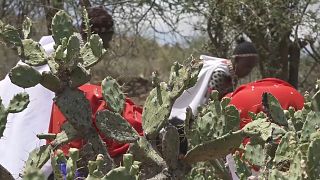Benin
Bérénice Nononga is a young mother.
To wash her baby and herself twice a day, she needs a lot of hot water.
So she has to make several fires a day using firewood or charcoal - a method she prefers over biogas.
"The firewood is faster because the gas only lasts a few days. I am a nurse and I have to constantly heat water and my child's tea. On top of that, I have to prepare food. At the end of the day, the biogas only lasts three days here. So we have to commute all the time to get the biogas. We prefer this option, which is more practical," says Nononga.
Nononga lives on a small farm with her husband. She is lucky to have enough trees on their property to make as many fires as she wants.
She uses the same type of tree that is used to make charcoal.
The business of this charcoal seller would no longer exist without customers like Bérénice.
"This period is not good for the charcoal trade. Otherwise, in normal times, we sell 10 to 20 bags of charcoal per day. In one month, we (usually) sell 500 bags," says Severin Atchouke, the coal seller.
His sales have been halved.
Fifty km (31 miles) away from Cotonou, in this village, an eco-friendly initiative is developing.
A Swiss foundation has built a new kind of power plant.
It buys or barters household waste for biogas. Alice Codjo is here to exchange her rubbish.
"I brought household waste that I want to weigh and exchange for biogas with which I will prepare food at home," says Codjo.
First, her rubbish is weighed.
For 12 kg (26 pounds) of waste, she is entitled to a 4 kg (9 pounds) biogas bag.
Her biogas bag is then loaded.
The filled bag has straps so Codjo can carry her biogas like a backpack.
As soon as she gets home, Codjo puts water on the fire.
"Cooking is faster than with firewood. This biogas does not leave soot beneath the pots. That is why I have adopted it," says Codjo.
This initiative is supported by the foundation ReBin. Its aim is to encourage a circular economy and to show the population that waste is a resource.
"We have the opportunity to trade waste for biogas, for compost, for drinking water, for fish, for market garden produce. The Rebin Foundation valorizes organic waste in the commune of Toffo,'' says Mardochée Sewaï, engineer in waste management and recovery.
The growing popularity of biogas here has led to a reduction in deforestation according to environmental specialist Hénock Gnanga.
"From now on, these communities will no longer destroy the trees they have at home or protected areas and forests. But from now on, they have the possibility to contribute by their activities to produce gas that they themselves will use on the spot,'' says Gnanga.
Since the opening of the centre, waste has become a valued commodity. When people steal household waste in Toffo, they are summoned to the police station.
Bartering waste for biogas is slowly changing attitudes, and the transition to low-cost renewable energy is becoming a reality.











04:11
Nigeria’s museum to oversee return of Benin bronzes
01:00
Pics of the day: January 24, 2025
11:02
Benin: Driving the Caribbean-Africa Economic Corridor? [Business Africa]
01:00
Kémi Séba announces candidacy for Benin's 2026 presidential election
Go to video
France: Beninese activist Kemi Seba freed
01:19
Benin: Prominent personalities, allies of President Talon accused of plotting coup